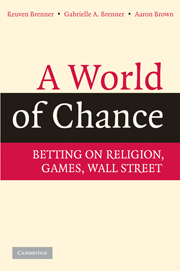Book contents
- Frontmatter
- Contents
- Preface
- Acknowledgments
- 1 From Religion to Risk Management: What to Do When Facing Uncertainty?
- 2 Anything Wrong with Gambling as a Pastime?
- 3 Are You Rich? Risk-Taking and Gambling, or the Leapfrogging Instinct
- 4 Betting on Futures and Creating Prices
- 5 Gambling as Banking: Poker, Junk Bonds, and Central Banks
- 6 Lottery Is a Taxation, and Heav'n Be Prais'd, It Is Easily Rais'd
- 7 Politics and Prohibitions; or, What's a Good Tax Anyway?
- 8 How Gamblers and Risk-Takers Correct the Future
- Appendix 1 Gambling and Risk-Taking: The Leapfrogging Instinct
- Appendix 2 Human Nature and the Civilizing Process
- Appendix 3 A Statistical Profile of Gamblers
- Notes
- Bibliography
- Name Index
- Subject Index
2 - Anything Wrong with Gambling as a Pastime?
Published online by Cambridge University Press: 06 July 2010
- Frontmatter
- Contents
- Preface
- Acknowledgments
- 1 From Religion to Risk Management: What to Do When Facing Uncertainty?
- 2 Anything Wrong with Gambling as a Pastime?
- 3 Are You Rich? Risk-Taking and Gambling, or the Leapfrogging Instinct
- 4 Betting on Futures and Creating Prices
- 5 Gambling as Banking: Poker, Junk Bonds, and Central Banks
- 6 Lottery Is a Taxation, and Heav'n Be Prais'd, It Is Easily Rais'd
- 7 Politics and Prohibitions; or, What's a Good Tax Anyway?
- 8 How Gamblers and Risk-Takers Correct the Future
- Appendix 1 Gambling and Risk-Taking: The Leapfrogging Instinct
- Appendix 2 Human Nature and the Civilizing Process
- Appendix 3 A Statistical Profile of Gamblers
- Notes
- Bibliography
- Name Index
- Subject Index
Summary
Which shows how false ideas about risk, gambling, and pastimes gain currency.
Old ideas often get rehashed, dressed in new jargons, and pass for evidence. The previous chapter examined the origins of some such ideas, which to this day pass for people's moral beliefs, influencing debates about risk-taking in general and gambling in particular. This chapter discusses a wide range of innovative – and false – arguments still used today to condemn and outlaw people's entertainment choices in general, and their gambling, and occasionally their drinking, in particular. Many of these ideas may strike readers first as strange, as ideas belonging to distant pasts, ideas that should have long ago been discarded.
But it is impossible to reject the view that a variety of selfish, disguised interests, rather than sincere beliefs, have been behind ferocious attacks against gambling and other forms of entertainment. The accusers repeatedly achieved their goals of either eliminating the competition or myopically ensuring government bureaucracies of a tax base (though the alternatives would have been far better, as is discussed in later chapters).
On occasion, one can find paper trails, like those in the recent Jack Abramoff scandal in Washington, that trace in minute detail the spread of false ideas about gambling in political circles. Abramoff's manipulations to incite opposition to new gambling businesses so as protect existing ones by dusting off ancient prejudices would make a Machiavellian proud.
- Type
- Chapter
- Information
- A World of ChanceBetting on Religion, Games, Wall Street, pp. 17 - 37Publisher: Cambridge University PressPrint publication year: 2008



